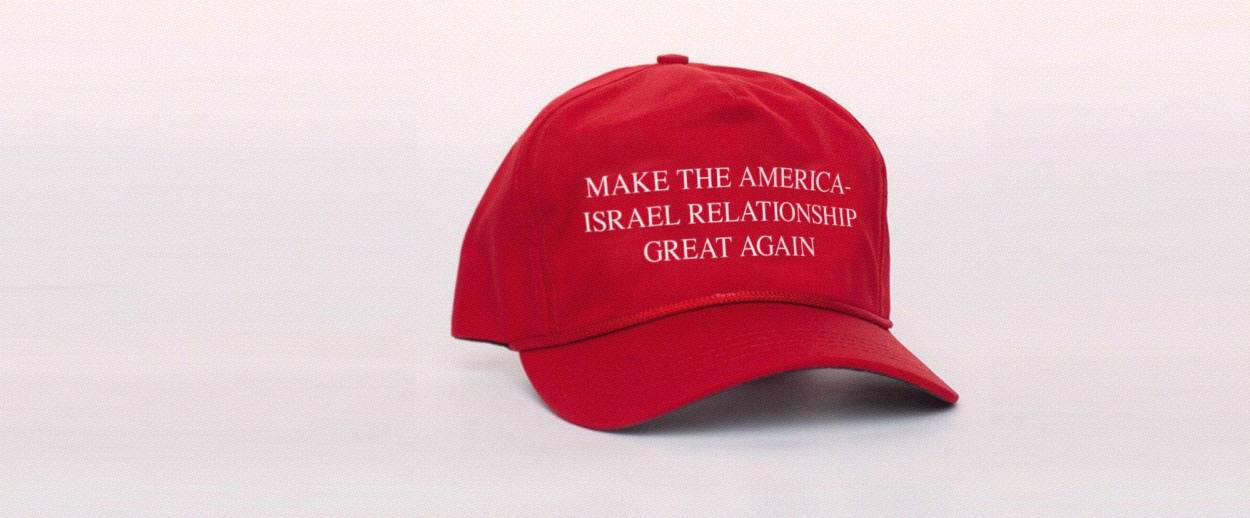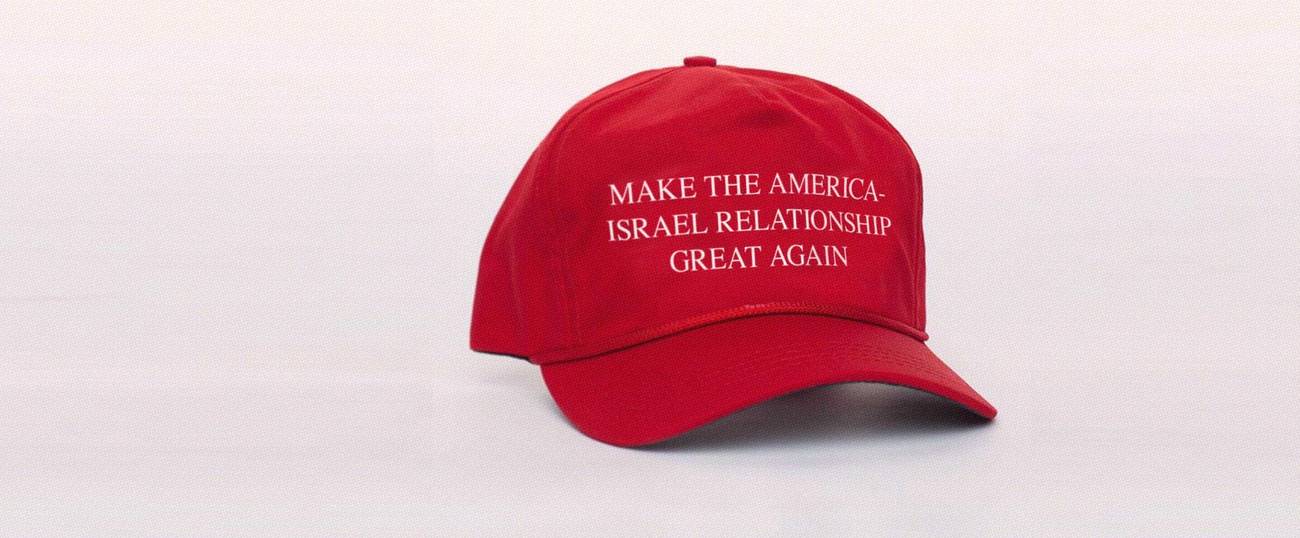Though some Americans may not want to hear it, the election of Donald Trump has changed Israel’s strategic situation dramatically for the better. Prepared to deal with what was presumably a somewhat friendlier version of the Obama administration run by Hillary Clinton, Jerusalem is now looking at what may be the most pro-Israel White House in the history of the bilateral relationship. The Israelis have been relatively quiet about their enthusiasm for the Trump administration—partly because the American public is still so dramatically split on the election, and partly because it was accused of siding with the 2012 Republican nominee for president. But the government of Benjamin Netanyahu had a favorite in the November race—and he won.
As far as the Netanyahu government is concerned, it’s impossible to imagine an American White House more attuned to Israel’s concerns than Trump’s. One senior Israeli official likened Trump’s picks to a “dream team” of pro-Israel U.S. policymakers—a uniquely favorable lineup that presents Israel with an opportunity to make strategic gains. Most important to Israel, according to the same official, is Iran. “We haven’t changed our view of the nuclear deal with Iran or Iran’s malevolent role in the region,” the official told me. “But the incoming administration sees both the nuclear deal and the danger posed by Iran very differently than the outgoing administration. They believe that this deal and Iran’s aggression and support for terror is not only bad for Israel and the region. They think it is bad for America.”
The first item on Israeli Prime Minister Benjamin Netanyahu’s list when he talks to President-elect Donald Trump will be the strategic threat posed by the Iranian nuclear program and consequently the Joint Comprehensive Plan of Action, which all but guarantees an Iranian breakout within 15 years. “The problem of how to deal with this deal is something I will discuss with President Trump when he takes office,” Netanyahu told a Saban Forum audience in Washington by satellite video this weekend. “Iran has actually become an even more aggressive power.”
There is no doubt that Netanyahu sees Trump as a much more sympathetic listener than his predecessor, Obama. It is no secret that one of the men closest to Trump, his son-in-law, Jared Kushner, is adamantly opposed to what Netanyahu described this weekend as a “bad” deal. Indeed, Trump has stacked his national security cabinet with figures on the record for their opposition to the Iran Deal, like secretary of defense nominee Gen. James Mattis, national security adviser Gen. Mike Flynn, and Rep. Mike Pompeo, who shortly before being named nominated for CIA director tweeted “I look forward to rolling back this disastrous deal with the world’s largest state sponsor of terror.”
Just one month ago, the United States was a self-hobbled superpower that had slashed its defense budget and reconfigured its traditional alliance system in the Middle East by swapping in Iran for traditional partners like Israel, Saudi Arabia, and Turkey. The smart money was on Hillary Clinton succeeding Obama, and the Israelis were wondering how to manage what was likely to be only a slightly less complicated relationship with another Democratic administration whose foreign policy frameworks and assumptions seemed likely to remain largely constrained by the choices made by its predecessor. One Netanyahu aide reportedly likened a Clinton presidency to four years of a Saban Forum. And while Clinton quietly signaled to pro-Israel supporters that she was opposed to the Iran Deal, as I learned in a trip to Israel shortly before the election, Israeli officials didn’t entirely trust her.
“Clinton had the ability to crash the deal,” Yossi Kuperwasser, former head of the research division of military intelligence, told me in Jerusalem. “She told a journalist that the Iranians should not have any centrifuges because there is no civilian justification for it. Had she come out against the deal, all the Democrats who wanted an excuse to oppose it would have also. We understand for political reasons why she didn’t, but it didn’t give us much confidence she would do much about it.”
“The Iranian nuclear program is the biggest threat Israel has ever faced. Some people say that the Iranian nuclear threat is not immediate,” Kuperwasser told me over breakfast in Jerusalem. “But the deal guarantees that the Iranians will have the capability to have an arsenal of nuclear weapons in 15 years. OK, it’s not tomorrow, but for a country our size, a nuclear arsenal in the hands of a regime like that within 15 years is immediate enough.”
Yet while the Netanyahu government and the Trump White House may see eye to eye on Iran, it seems right now that they are less likely to agree on Russia, more particularly Moscow’s escalation in Syria. A reported meeting between Russian officers and senior Hezbollah commanders underscored the fact that Vladimir Putin’s position in Syria is in turn dependent on Iran.
Israeli sensitivities about Russia serving as the de facto air force for Iran—perhaps eventually limiting overflights and complicating future IAF operations against Hezbollah in Lebanon, or the Iranian nuclear program—were driven home to me on a recent visit to Israel by the number of Israeli officials I spoke with who were reluctant to discuss the topic at all. One potential concern that did emerge from these conversations was apprehension over Trump’s desire for his own reset with Russia—which may well be consummated at the expense of countries in Eastern Europe, the Middle East, or both.
“Israel doesn’t want a Molotov-Ribbentrop Pact in Syria,” one former Israeli intelligence officer told me.
When do Israeli officials brief the Trump team on Israel’s exact relationship with Russia? I asked. “That’s already happening,” he explained. “Our interests are in keeping Hezbollah and the IRGC off our border in southern Syria and stopping the transfer of strategic weapons. In early meetings with the Russians, one Israeli official expressed concern for the Russians, saying Israel wouldn’t want a repeat of the War of Attrition when it shot Russian pilots out of the sky. The Russians laughed.”
And so what should the Israelis tell the Trump administration about Russia? “You can have tactical agreements with the Russians, like we do, but you can’t settle everything,” the former intelligence officer answered. “The Russians have too much in line with Iranian interests to make it possible for the United States to line up with it across the board.”
What the world wants from Israel, as Netanyahu recently told a New York audience where Hudson Institute presented him with the Irving Kristol Award, is cooperation on technology and terrorism—“T and T,” as the Israeli leader put it. Israel is a world leader in hi-tech, and much of the rest of the world wants to learn from a small country that punches well above its weight economically. As for terror, with ISIS or ISIS-inspired groups spreading across the globe, and Iran increasingly ambitious and dangerous, governments from Riyadh to Singapore want to know how to ensure their national security. As the Obama White House shrunk the American footprint across the Middle East, the seeming paradox is that America’s key regional partner has become more independent—and more important.
“The conventional wisdom is that Israel is more isolated than ever,” said Dore Gold, until recently the director general of Israel’s foreign ministry, who has since returned to his post as president of the Jerusalem Center for Public Affairs. “But the truth is exactly the opposite,” he told me in Jerusalem. “We have a delegation from foreign countries every day that want to enhance their relationships with us.”
Gold described how relationships are deepening with Africa as well as Asia in addition to the Gulf Cooperation Council states, led by Saudi Arabia. Indeed, just recently a former Saudi military officer and now think-tank director, Gen. Anwar Eshki, visited Gold and his former colleagues at the foreign ministry. How much further can a relationship conducted mostly in quiet go? I asked Gold. “It’s a story in motion,” he said.
Some Israeli officials believe the Trump administration may be able to broker the kind of comprehensive regional understanding that has eluded Western diplomats for the half-century since the Six Day War eliminated the fantasy of pushing the Jews into the sea. The sticking point, say a number of Saudi analysts I’ve spoken with, is that Israel has to show some movement on peace with the Palestinians for Riyadh and Jerusalem to move closer.
“Why don’t the Israelis just follow the Saudi peace initiative?” one member of the Saudi royal family recently asked me. I suggested to him that he ask the Jordanians, who fear that an Israeli withdrawal from the West Bank will invite jihadists eager to attack Israel to use Jordan as a launching pad, thereby destabilizing the Hashemite kingdom. Without the IDF on the West Bank, some Islamist militants are also going to traverse Saudi to take a shot at the Zionists. If Israeli-Saudi rapprochement is premised on the Saudi Peace Initiative, someone is going to have to explain the issues to Riyadh in detail. Perhaps the Trump White House might use the Saudis’ reluctance to make its own case publicly to cement the country’s growing bonds with Israel and places beyond. Perhaps a comprehensive agreement will come as a result of the Saudis coming to believe that the road to Washington goes through Jerusalem.
It’s hard to know exactly what Trump’s Middle East policy will look like—what the new White House’s level of engagement will be in the region, or, most vitally for Israel, whether it will walk away from the JCPOA, enforce it, or try to renegotiate it. Israelis are certain about a few things, however—Donald Trump and the figures he’s appointed to top national-security positions are all friends of Israel.
Most important, as Yossi Kuperwasser told me, “Trump says he wants to make America great again. And a strong America is good for Israel.”
You can help support Tablet’s unique brand of Jewish journalism. Click here to donate today.

